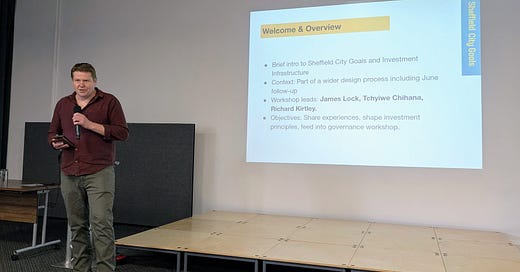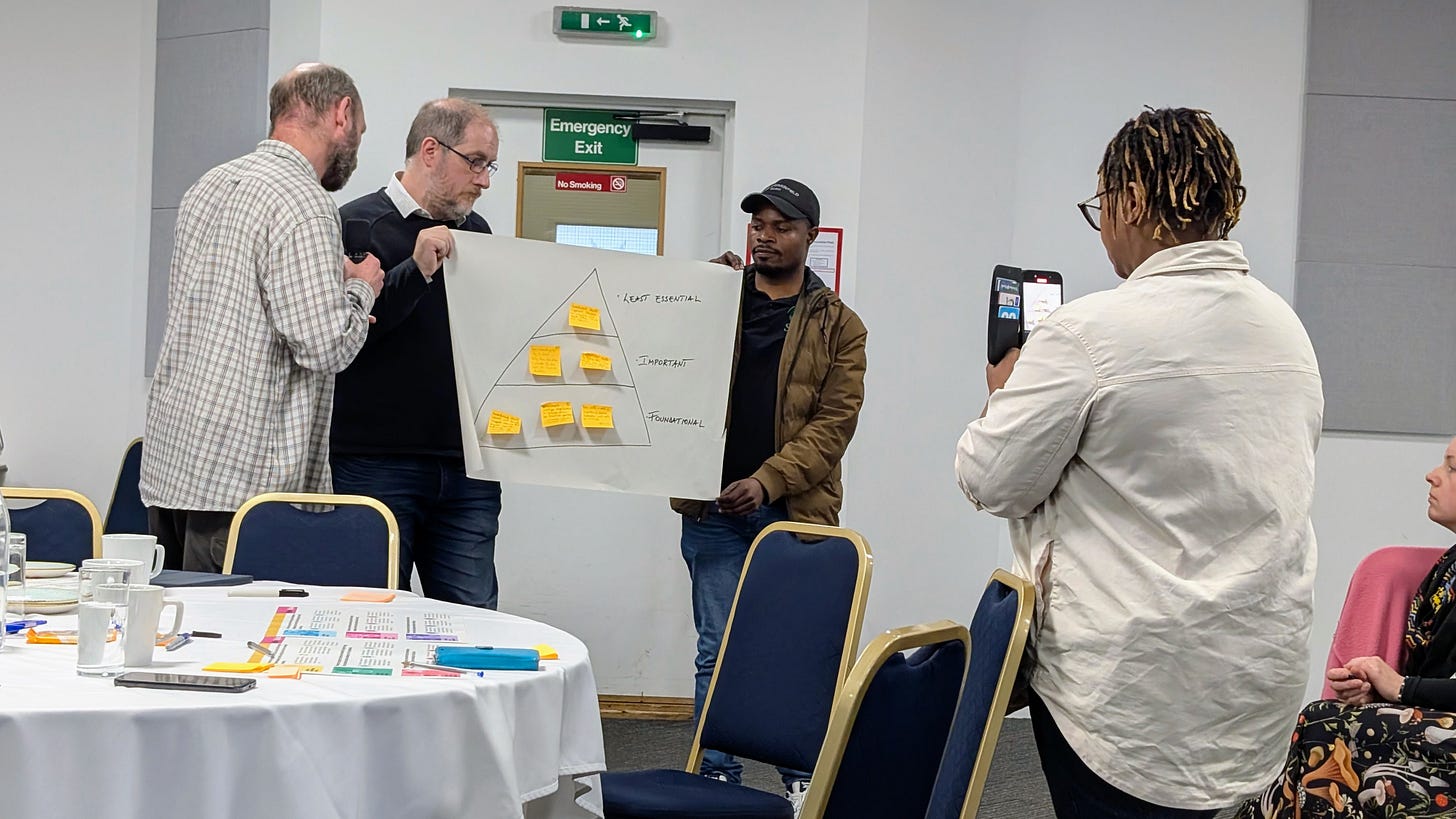Igniting Investment in Sheffield
Insights from the Sheffield City Goals Workshop on Demonstrators & Investment
Introduction: Setting the Scene for Change
This morning, I joined a dynamic group of Sheffielders, community leaders, and stakeholders gathered at The Workstation for a sincere workshop focused on "Demonstrators and Investment" as part of the Sheffield City Goals initiative. Facilitated by James Lock, Tchywe Chihana, and Richard Kirtley, the session aimed to harness collective experience to shape how investment can best flow to achieve our city's shared aspirations. This workshop is a key component of a wider design process, with insights feeding directly into a June follow-up and a crucial Governance workshop scheduled for May 28th.
The core objectives were clear: to share experiences with funding, collaboratively shape investment principles, and generate valuable input for the upcoming governance discussions.
Workshop Overview: A Journey Through Ideas and Actions
The workshop was structured into three engaging activities:
Activity 1: Exploring Our Experiences with Funding (Active Listening)
Participants broke into small groups for an active listening exercise. One person at a time shared their experiences (positive, negative, surprising) with accessing or distributing funding, while others listened and scribed. Key themes explored included:Access: Who can get funding and why?
Blockers: What are the common hurdles?
Surprises: Unexpected outcomes or processes.
Positives: What works well and should be amplified?
Reflections were gathered, painting a diverse picture of the current funding landscape.
Activity 2: Funding the City Goals – Identifying Gaps and Principles
This activity considered the practicalities of funding the Sheffield City Goals.Part 1 (Where might the gaps be?): Using printouts of the City Goals, table discussions focused on identifying challenges in funding particular goals. A poignant example raised was the difficulty our current economic system has in valuing nature (e.g., the financial ROI of planting a tree), making investment in Green & Resilient goals (Goals 4-6) particularly challenging.
Part 2 (Creating a Delta Pyramid of Principles): Building on the challenges, groups then formulated investment principles. For instance, drawing from City Goal 2 ("We have the education, training, skills, and resources we need to pursue our curiosity and develop new ideas..."), a potential principle emerged: "We commit to enabling more people to get seed funding for new ideas, research and development that can act in the public interest." These principles were then prioritized using a "Delta Pyramid" model, categorizing them as Foundational/Must Have, Important, or Least Essential/Nice to Have. Groups fed back on foundational principles, what builds upon them, and any identified tensions or contradictions.
Activity 3: Gifting to Governance – Teasing Out Tensions
This crucial session aimed to surface the most important tensions, constraints, and trade-offs surrounding how and where investment should flow in Sheffield. The insights from this activity are intended as a "gift" to inform the next Governance workshop. The discussion was rich and varied, highlighting several critical areas:Accessibility and Inclusivity:
A recurring question was, "Where is this room?" – acknowledging that many decision-making spaces are invisible or inaccessible to large swathes of the community.
How can we ensure that conversations about Sheffield's future reach "the edges" – those communities and individuals currently unheard or underrepresented?
Specific challenges were noted for groups such as those for whom English is a second language, individuals with mental health difficulties, or neurodivergent community members, who may find traditional consultation methods difficult to engage with.
The Nature of Representation:
There's a strong desire to move beyond tokenistic consultation.
A debate emerged around the role of "representatives." Are they truly reflecting community needs, or do they sometimes become more aligned with the system they are engaging with?
The idea of reframing representatives as "bridge-builders" or "connectors" was explored – individuals who can genuinely link decision-makers with grassroots needs, rather than simply being a filter.
Building Trust and Reciprocity:
A powerful theme was the need for genuine partnership, not just information harvesting. Engagement should build sustainable relationships.
The importance of feedback loops was stressed – communities need to see how their input is used.
"Trust comes first" was a key sentiment, suggesting that funding and support should flow from established, trusted relationships.
Shifting Power Dynamics:
How can we shift from top-down funding models to more community-led or co-created approaches?
The need for a "spirit of giving" rather than creating dependency was highlighted.
Challenging existing power structures and ensuring that funding decisions are not made by "the same people in the room, leading to the same limited outcomes" is vital.
Valuing Non-Monetized Contributions:
Participants emphasized the importance of recognizing and "mapping the gifts of Sheffield" – the skills, time, care, and social capital that aren't currently monetized but are fundamental to the city's wellbeing.
Sheffield's "caring capacity" was noted as a foundational strength upon which financial structures often rest.
Systemic Challenges & Future-Proofing:
The unpredictability of climate change and geopolitical shifts were acknowledged as significant factors that investment strategies must consider.
Investment decisions need to account for future generations and avoid unintended negative consequences, especially concerning ecological systems and planetary boundaries.
Key Takeaways & Emerging Principles for Project Ignite & Love Sheffield
The workshop underscored several vital considerations for how Sheffield approaches investment:
Trust is Foundational: Building and maintaining trust between funders, communities, and delivery organisations is paramount.
Inclusivity is Non-Negotiable: Processes must be designed to be truly accessible, ensuring diverse voices are not just heard but are integral to decision-making.
Co-creation and Collaboration: Moving beyond consultation to genuine co-design of solutions and investment strategies.
Value Diverse Contributions: Recognising and leveraging the full spectrum of Sheffield's assets, including social capital and community "gifts," not just financial metrics.
Empowerment over Dependency: Funding should aim to strengthen communities and build their capacity, fostering resilience and self-determination.
Transparency and Feedback: Clear communication about how decisions are made and how community input influences outcomes is essential.
Long-term Vision: Investment must consider future generations and the long-term health of our city and planet.
Next Steps: Continuing the Conversation
The insights gathered from this workshop will be synthesised and "gifted" to the upcoming Sheffield City Goals Governance Workshop on Tuesday, May 28th. This will ensure that the principles and tensions identified directly inform how governance structures can support more equitable and effective investment.
Furthermore, a follow-up design session in June will continue to build on this work, moving towards actionable blueprints.
Get Involved with Project Ignite & Love Sheffield!
The energy and commitment in the room were palpable. For those involved with Project Ignite and Love Sheffield, this workshop provides rich food for thought on how we can:
Champion inclusive and accessible engagement in all our projects.
Advocate for funding models that build trust and empower communities.
Seek out and amplify the diverse "gifts" within our neighborhoods.
Continue to participate in the Sheffield City Goals process and encourage others to do so.
Stay tuned for more updates and opportunities to contribute to shaping a thriving, equitable, and resilient Sheffield for all!
Kind regards,
Brian Mosley
Founder, Love Sheffield & Project Ignite
Author of "Uniting Hearts, Igniting Change"





